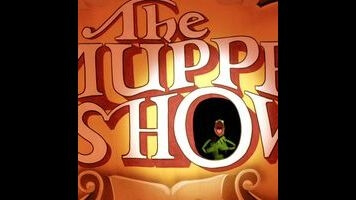The Muppet Show: “Episode 207: Edgar Bergen”/“Episode 208: Steve Martin”

Of the 24 guest stars featured during The Muppet Show’s second season, eight would eventually join The Muppets on the big screen: seven (Milton Berle, Edgar Bergen, Steve Martin, Madeline Kahn, Dom DeLuise, Bob Hope, and Cloris Leachman) in The Muppet Movie and one (John Cleese) in The Great Muppet Caper. I bring this up not only because that count includes both of this week’s guest stars—it’s also a sign of the clout The Muppet Show acquired in its second season that an old pro like Bergen and an-of-the-moment star like Martin would agree to spend so much time among the frogs, pigs, and monsters.
It’s also a sign that, for The Muppets’ unique voice and all the difficulties Jim Henson had in finding a regular television home for his characters, The Muppet Show earned those characters their place as peers with some of the most important figures of 20th century popular culture. The Muppet Show has its own, skewed take on the showbiz world, but it’s one that meshes nicely with that of Bergen, Martin, and the guests of the series’ other standout episodes. It was both of a piece with pop culture and operated within its own niche—an insider spoof on the vagaries of the entertainment industry that the whole family could enjoy. I’ve written before that The Muppets, as characters, operated best as outsiders, but if it wasn’t for various connections formed before or after The Muppet Show was in production, Kermit The Frog wouldn’t have appeared in movie theaters alongside Charlie McCarthy—or eventually share Charlie’s digs at the Smithsonian.
Episode 207: Edgar Bergen
“With our special guest star”: Even if Edgar Bergen hadn’t appeared in The Muppet Movie, Jim Henson would’ve likely dedicated the film to the ventriloquist’s memory. Since his days on the vaudeville circuit, Bergen essentially performed a one-man, two-puppet version of The Muppet Show, playing setup man to sardonic, pint-sized aristocrat Charlie McCarthy and his rural companion, the affable rube Mortimer Snerd. Henson and Bergen held each other’s work in high esteem, so it’s only natural that Bergen, Charlie, and Mortimer would make it to The Muppet Show. Episode 207 features some lighthearted jabs at Bergen’s technique—the illusion of ventriloquism tends to fall apart when the ventriloquist’s in a tight close-up—but those come from Charlie’s wooden lips. Otherwise, the guests are treated with the same type of reverence the show gave Milton Berle a few weeks back, rolling out the red carpet and the Lionel Bart show tunes to pay tribute to a performer who helped carve a space for The Muppets on TV and film.
“The most sensational, inspirational, celebrational”: As the member of the Muppet troupe with the closest ties to vaudeville and burlesque, Fozzie Bear once more inspired by an old pro to add something new to his act. The bear uses his traditional comedy spot to debut his variation on Charlie McCarthy—a be-monocled bear named Chuckie—but gets stuck when the dummy doesn’t talk back. True to Frank Oz’s sunnier approach to the character in season two, Fozzie plugs right along, eventually shaking Chuckie to pieces when he won’t deliver the punchlines to Fozzie’s hoary setups. (The segment’s button: The dummy didn’t feel like talking because he wasn’t with a lady last night.) I love, love, love this refreshed take on Fozzie—he’s still flappable, but his faith in the act has more comedic mileage than any of the winging and discouragement he displayed in the first season. In other words, the bear’s no dummy.
“It’s like a kind of torture to have to watch the show”: Both of this week’s episode are unimpeachable, so finding any faults amounts to nitpicking. On a technical level, acknowledging the fact that Bergen (for all his comedic abilities and skill at bringing Charlie and Mortimer to life) isn’t the most technically adept ventriloquist doesn’t distract from the fact that his lips are always moving. With a few episode’s experience in keeping puppeteers out of the shot, director Philip Casson does a good job of maintaining focus on the puppets when he can—but in the closing segment, it’s hard not to feel like the magic of Bergen’s act was communicated best on the radio or on stage. (You know, where it was harder to figure out why Charlie was chastising his creator for flapping his gums.)
“It’s time to play the music”: Here’s a chicken or the egg scenario: In early 1977, Ray Stevens—under the pseudonym The Henhouse Five Plus Too—entered the Billboard charts with a cover of “In The Mood,” one of the most obnoxious/stupidly genius novelty records in Stevens’ long, occasionally racist career. The joke of the recording, of course, is that the “instruments” are just Stevens clucking like a chicken to the tune of the Glenn Miller standard—an awful lot like how the Muppet chickens perform “Baby Face” in this episode. Is it possible Henson, Jerry Juhl, and company conceived of this segment before Stevens released his “In The Mood”? Maybe, but it doesn’t really matter—“Baby Face” has the advantage of visuals, including the rib-tickling sight of T.R. Rooster conducting the barnyard orchestra.
“It’s time to raise the curtain”: “Time In A Bottle” is a poignant tune (made all the more poignant by the fact that it was a posthumous hit for singer-songwriter Jim Croce) whose spirits are lifted with a fun Muppet treatment in Episode 207. The scientist singing the song regresses in age through simple camera tricks, so it’s a combined effort by the puppet builders and Henson (whose vocals modulate with each variation of the scientist while still retaining the same basic, nasally qualities) to fully sell the transformation.
